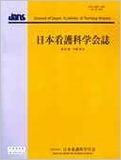Japanese
English
- 販売していません
- Abstract 文献概要
- 参考文献 Reference
- サイト内被引用 Cited by
要旨
目的:保健師における特定妊婦への妊娠期から出産後の子どもの養育支援を含む,一連の支援プロセスを明らかにする.
方法:母子保健5年以上の経験で,同一特定妊婦の妊娠期と出産後に2回以上かかわり,一連の保健師活動を自ら語ることができる保健師11名を対象に半構成的インタビューを行った.分析は修正版グラウンデッド・セオリー・アプローチを用いた.
結果と結論:特定妊(産)婦への保健師による支援プロセスは『子どもへの愛着を基に生活する能力の見極め』であった.このプロセスは【妊婦とのつながりづくり】【妊(産)婦の甘えられる居場所探し】【妊(産)婦の生活の見極め】【閉ざされないサポートづくり】【安全のためのネットづくり】で構成された.保健師は脆弱性を抱える特定妊(産)婦の主体性を育てるために,身近な人の潜在的力を活用しながら子どもの安全確認を関係機関に外在化し,特定妊(産)婦の内面に働きかけることが重要である.
Aim: The aim of this study is to determine public health nurses' support process for specified expectant mothers (Tokutei-ninpu), as pregnant, postpartum, and child-rearing women with special needs.
Methods: Participants were 11 public health nurses with more than five years' experience with maternal and child health, and experience concerned with the same specified expectant mothers more than two times during the pregnancy and delivery period. Support process for pregnant women with special needs were examined through semi-structured interviews. The data were analyzed using the grounded theory approach.
Results: We found that public health nurses' support process for pregnant women with special needs focused on [identifying maternal attachment capacities]. This process was explained by five categories: building relationships between pregnant women and public health nurses, finding locations to depend on neighborhood people (pregnant women's indulgent dependency or amae), identifying capacities for pregnant life, providing continual support for pregnancy, and providing a support net for pregnancy and infant security.
Conclusions: The social vulnerability of pregnant women with special needs shifted to independence through the power of neighborhood support; public health nurses assessed the internal psychological function of pregnant and enlisted community resources for infant security.
Copyright © 2017, Japan Academy of Nursing Science. All rights reserved.


